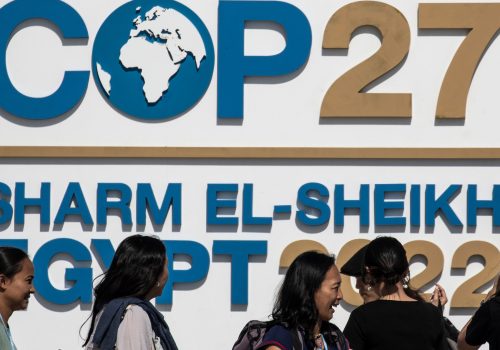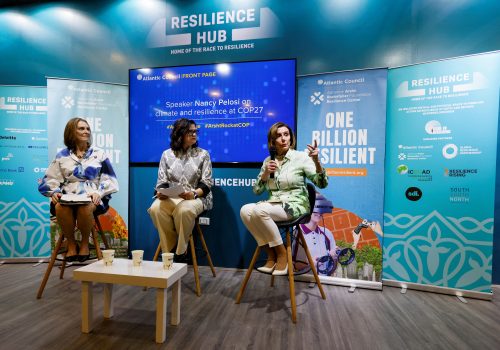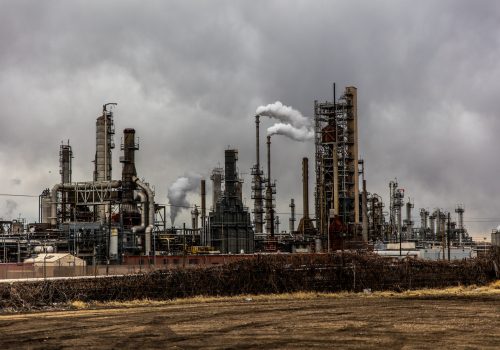The big success and bigger failure of COP27
GET UP TO SPEED
The Global South won, but did the climate? Negotiators at the UN climate-change conference known as COP27 extended their stay in Sharm el Sheikh, Egypt to hammer out a final agreement that will create a loss and damage fund to compensate developing countries harmed by climate change. But the deal barely addresses other urgent topics such as reducing greenhouse-gas emissions, even as the consequences of climate change become clearer by the day. Have negotiators done enough to help save the planet and the people on it? What other surprises cropped up at COP? Our experts, who were on the ground in Sharm el Sheikh, are here to weigh in.
TODAY’S EXPERT REACTION COURTESY OF
- Kathy Baughman McLeod (@KBMcLeodFLA): Senior vice president and director of the Adrienne Arsht-Rockefeller Foundation Resilience Center
- Jorge Gastelumendi (@Gasteluj): Director of global policy at the Adrienne Arsht-Rockefeller Foundation Resilience Center and former climate negotiator for the government of Peru
- Landon Derentz (@Landon_Derentz): Senior director of the Global Energy Center and former director for energy on the US National Security Council and National Economic Council
A damaging loss?
- While the creation of the loss and damage fund was “immensely welcome,” Kathy tells us, the lack of new emissions-reduction commitments by the countries gathered at COP27 represents an “utter failure” that is “devastating to plans to keep global heating to no more than 1.5 degrees Celsius” above pre-industrial levels, as pledged in the 2015 Paris Agreement.
- Jorge says ”current major emitters” such as China, India, Brazil, and Indonesia are let off the hook by the lack of those commitments—and by the fact that, as developing nations, they won’t have to contribute to the loss and damage fund, “which could have been one other leverage point to” make them cut emissions. As a result, countries like these are poised to replace developed countries as the primary cause of climate-related loss and damage.
- The structure of the loss and damage fund “also lacks a clear focus on the most vulnerable, which poses fundamental questions about the future use of the funds by recipient countries,” Jorge notes.
Fossil flip-flop
- Kathy attributes much of the conference’s failures to attack global warming to the fact that “the fossil-fuel industry is still so deeply influential over country delegations,” with more than six hundred fossil fuel-tied delegates in attendance according to the advocacy group Global Witness.
- Vladimir Putin had a say too: Russia’s invasion of Ukraine has contributed to a near-term global energy crisis that at times has sidelined long-term climate concerns. The COP results “did not match the level of urgency many in the climate community were hoping for,” Landon tells us, because “climate action appears to have an energy-security problem.”
- Fossil-fuel geopolitics also helped deliver the Global South’s big win. “Europe’s present hunt for conventional oil and gas resources in Africa and Latin America,” a major break from the West’s recent anti-fossil fuel stance, may have “served to disarm” long-running Western efforts to block a loss and damage fund, Landon says.
- That’s because this year’s mad hydrocarbon dash is forcing Western countries “to grapple with the consequences of failing to move more swiftly to abate global emissions,” Landon adds.
Adapt or die
- For real progress, Kathy says, you have to look beyond the negotiators: “NGOs and civil society, young and indigenous activists, philanthropy and the private sector (particularly the finance and insurance sectors), and mayors and governors played their largest role yet in driving new solutions for climate mitigation and adaptation.”
- One example, as Jorge points out, is the Sharm el Sheikh Adaptation Agenda (SAA), a commitment from non-state actors to build climate resilience for four billion of the world’s most vulnerable people. The Resilience Center team helped secure a commitment in the SAA to mobilize some three thousand insurance companies to finance climate-adaptation projects. “In short, we managed to elevate a business-led effort into a global policy platform,” Jorge adds.
- Next year’s COP will be a short hop away in the United Arab Emirates, and Kathy says the agenda “will need to focus on adaptation and resilience, and taking the next steps in detail on the loss and damage facility.” But once again, she adds, the formal negotiations will only be part of the story: “I expect action by the non-state actor community, especially around finance, to outpace the official process.”
Further reading
Mon, Nov 7, 2022
Live updates from COP27 as leaders battle climate change amid global crises
New Atlanticist By
Are global leaders heeding this year's wake-up calls with bold commitments at COP27? Our experts give their takes.
Thu, Nov 10, 2022
Nancy Pelosi and Kathy Castor at COP27: The US won’t abandon its climate leadership, regardless of who controls Congress
COP By Katherine Golden
The US House speaker and the chair of the climate committee appeared at an Atlantic Council Front Page event in Sharm el Sheikh, Egypt.
Fri, Nov 11, 2022
The target of limiting global warming to less than 1.5 degrees is practically dead. Why do emissions per capita matter?
Econographics By Amin Mohseni-Cheraghlou
Achieving the target to limit global warming to below 2, preferably 1.5 degrees Celsius, by the end of the century seems more unfeasible than ever. The reason is simple. The most critical of greenhouse gases have continuously risen in the past decade and CO2 emissions are only expected to grow more in 2022 and for the foreseeable future. COP27 needs to pave the path for a renewed international cooperative and enforceable framework to reduce global greenhouse gas emissions by the world’s top emitters both in absolute terms and in per capita terms.
Image: Delegates applaud as COP27 President Sameh Shoukry delivers a statement during the closing plenary at the COP27 climate summit in Red Sea resort of Sharm el-Sheikh, Egypt, November 20, 2022. REUTERS/Mohamed Abd El Ghany


